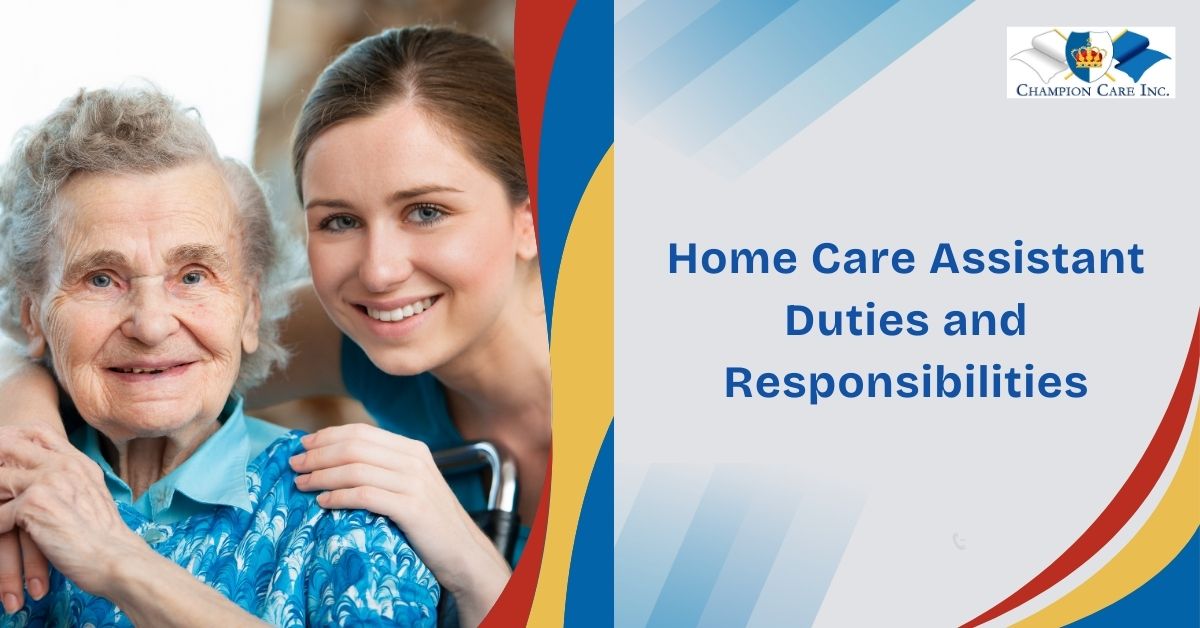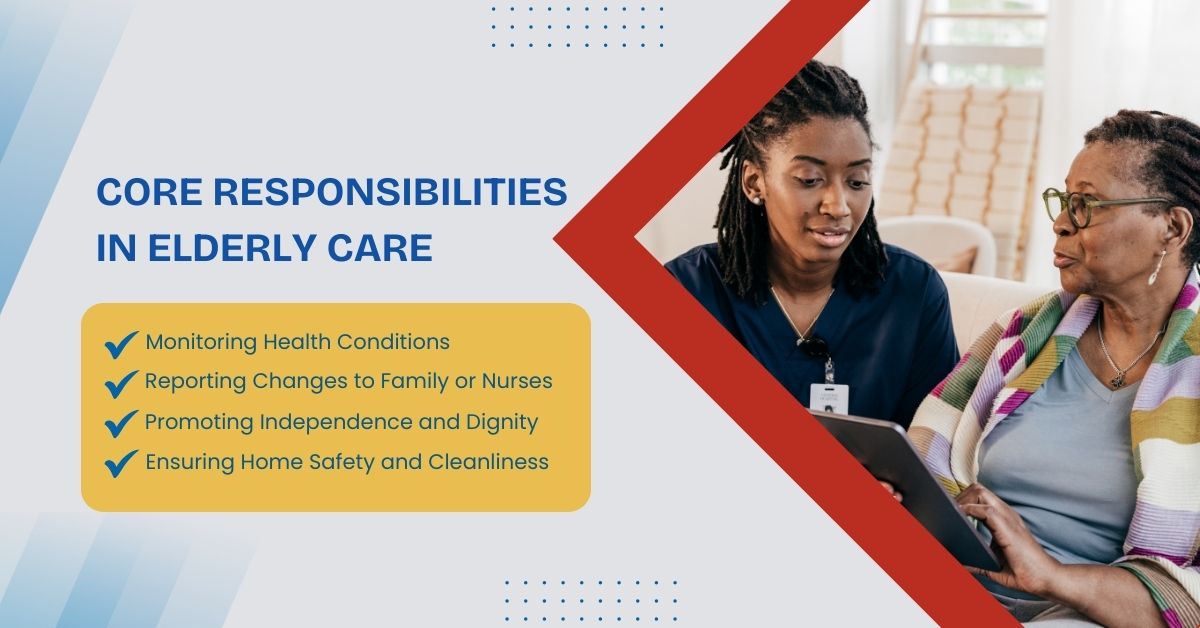A home care assistant is crucial in helping seniors and individuals with disabilities live well at home. In today’s world, an increasing number of people are opting for home care services to maintain their safety and independence. These assistants assist with daily activities, such as bathing, dressing, and eating. They also offer companionship and ensure the home is secure. As our society ages, home care becomes increasingly critical.
In this post, we’ll explore the primary duties of a home care assistant, the skills required, and how they support seniors in maintaining their health. We’ll also cover the differences between home care assistants and caregivers. It will help you understand what to expect from a home assistant or how to become one. It will demonstrate how their role extends beyond just daily tasks; they provide emotional support and make a genuine difference in the lives of those they assist.

What Is a Home Care Assistant Duties?
A Home Care Assistant helps individuals with daily activities at home. Duties include assisting with personal care, meal preparation, medication reminders, light housekeeping, and companionship. They support clients’ physical and emotional well-being, ensuring safety, comfort, and independence while following care plans and reporting any changes to healthcare professionals.
Who Needs a Home Care Assistant?
Home care assistants primarily work with older adults or individuals who are unable to perform specific tasks independently. They help with simple daily activities that can be difficult for these individuals. This can be as basic as helping with meals or providing companionship. The goal is to help them maintain their health and safety while living in their own homes.
Where Do Home Care Assistants Work?
Home care assistants work in different places. Most of them work in private homes, helping people stay independent. They may also work with home care agencies or in assisted living communities. No matter where they are, their focus is always the same: offering care and comfort to those in need.
Why Is Home Care Important?
Home care services are key for seniors and people with disabilities. Many prefer to stay in their own homes, where they feel comfortable and safe. A home care assistant makes this possible. They help people live the best life possible in their own homes, keeping them healthy and happy.
Home care aides provide much more than just physical help. They offer emotional support, which helps alleviate loneliness and enhance overall well-being. Their work is essential, and it makes a real difference in the lives of the people they care for.
Looking for home care services? Visit our page for more information on expert care and personalized support: Home Health Services.
Home Care Assistant Job Responsibilities and Duties
A home care provider has several vital duties that help people live well at home. These tasks are essential for ensuring safety, comfort, and independence.
Personal Care Tasks
One primary duty is helping with personal care. This involves assisting with activities such as bathing, dressing, and grooming. For many, these tasks become difficult. A home care aide ensures they can still maintain their hygiene and dignity.
Meal Preparation and Feeding Support
Another key task is meal preparation. Home care providers help make healthy meals and assist with feeding if needed, ensuring that the person receives the proper nutrition to stay healthy.
Medication Reminders
Home care aides help people remember to take their medications. While they don’t give the medicine, they remind the person when it’s time. This is crucial for managing health and adhering to treatment plans.
Mobility Assistance and Transfers
Another big part of the job is assisting with mobility. A home care assistant helps with walking, moving between rooms, and getting in or out of bed. This support helps keep the person safe and reduces the risk of falls.
Companionship and Emotional Support
The most crucial duty is providing companionship. Many people who need care often feel lonely. A home care assistant can offer emotional support through conversation, playing games, or simply being present. This emotional connection helps improve their mental well-being.
These key duties are essential for a home care assistant. They improve a person’s quality of life by providing both physical assistance and emotional support.
Core Responsibilities in Elderly Care
A home care aide plays a significant role in elderly care. Their role extends beyond daily tasks. They also ensure the well-being of older people by monitoring their health and promoting safety. Let’s take a closer look at the core responsibilities in elderly care.

Monitoring Health Conditions
One of the most critical tasks is monitoring health conditions. A home care assistant monitors changes in a person’s health, such as checking vital signs or noticing changes in behavior. This helps ensure that any issues are identified and addressed promptly.
Visit our home health services page for seniors to learn more about these services and the compassionate care options available.
Reporting Changes to Family or Nurses
If a home care provider notices changes in a person’s health, they should report them to the family or a nurse. This could include changes in eating habits, mood, or mobility. Timely communication is crucial to ensuring that the person receives the care they need.
Promoting Independence and Dignity
A home care provider helps seniors maintain their independence and autonomy. They assist as needed and encourage the person to take action for themselves, helping them feel empowered and respected. Promoting independence does not mean maintaining dignity and doing everything for the person.
Ensuring Home Safety and Cleanliness
Home safety is another vital responsibility. A home care assistant ensures that the person’s living environment is free of hazards. This may include removing obstacles, ensuring the home is well-lit, or assisting with basic cleaning tasks. A safe and clean house is essential for preventing accidents and promoting overall well-being.
These core responsibilities extend beyond helping with daily activities. A home caretaker guarantees that seniors feel safe, respected, and well cared for. Their work helps seniors maintain their health, independence, and dignity in their own homes.
Home Health Care Assistant vs. Caregiver: Key Differences
It’s essential to understand the difference between a home health care assistant and a caregiver. While both roles help those in need, their tasks, training, and responsibilities can vary. Here’s a breakdown of the key differences:
Scope of Tasks:
- Home Health Care Assistant: This position focuses on providing medical and personal care, including medication reminders, health monitoring, and support for physical mobility.
- Caregiver: Typically provides non-medical support, including assistance with daily activities, companionship, and basic household chores.
Qualifications and Training:
- Home health aide: This position often requires formal training or certification, particularly for tasks such as health monitoring, assisting with medical equipment, or providing basic medical care.
- Caregiver: May not require formal training. Many caregivers learn through experience or on-the-job training.
Who Hires Them:
- Home health care assistant: Usually hired by home care agencies or medical professionals for more specialized care.
- Caregiver: Can be hired privately by families, often for personal care needs that don’t require medical skills.
Medical Responsibilities:
- Home health care assistant: Can assist with health tasks like checking vital signs, managing medication, and following medical care plans.
- Caregiver: Typically does not handle medical responsibilities or administer treatments.
These differences highlight how the roles of home health care assistants and caregivers complement each other, providing a broad range of support to those in need.
Qualities That Make a Great Home Care Assistant

Certain qualities are essential to being a great home care assistant. These qualities help ensure that the person receiving care feels respected, safe, and well supported. Here are the key traits that make a home care aide:
- Empathy and Patience: A home care aide must be able to understand and relate to others’ needs. Patience is crucial when assisting with daily tasks, especially for individuals with limited mobility or cognitive impairments.
- Strong Communication: Clear communication with both the person receiving care and their family is essential. A great home care provider listens well, expresses themselves clearly, and ensures that the person’s needs are understood and met.
- Physical Stamina: Home caretakers often assist with physical tasks, such as lifting or supporting mobility. Having physical stamina helps them provide care without overexerting themselves.
- Reliability and Trustworthiness: Trust is vital in a caregiving role. Families need to know they can rely on a home care assistant to arrive on time and adhere to the care plan.
- Attention to Detail: A great home caretaker is always alert and aware of small changes in the person’s health, habits, or mood. This can make a significant difference in delivering high-quality care and identifying potential issues early.
These qualities make a home care assistant not just effective, but someone who can genuinely improve the quality of life for those they care for.
Supporting Seniors at Home: Beyond the Basics
A home care assistant provides more than basic personal care. They play an essential role in helping seniors live fulfilling, independent lives. Here are a few ways home care aides go above and beyond the basics.
Encouraging Hobbies and Social Interaction
Seniors often feel isolated, especially if they live alone or face mobility issues. A great home care assistant encourages them to stay active in their hobbies and social activities. Whether it’s playing board games, going for walks, or participating in community events, these activities are crucial for mental and emotional well-being. By engaging in meaningful activities, seniors feel more connected and less lonely.
Transportation and Errands
Home care providers also help with transportation. Seniors who can no longer drive may struggle to access doctor appointments, grocery stores, or other essential locations. A home care aide can step in by assisting with transportation to appointments or running errands for the person. This ensures that seniors stay connected to their communities and maintain their independence.
Family Support and Coordination
Another vital aspect of a home care assistant’s role is providing family support and coordinating care. They communicate with family members to update them on the senior’s well-being. They may also coordinate with medical professionals or other caregivers to ensure the person’s care plan is being followed. This helps keep everyone on the same page and ensures the senior receives the best possible care.
By providing these additional forms of support, home care aides significantly impact seniors’ overall quality of life. They help create a nurturing environment that allows seniors to thrive at home.
If you need a compassionate home care aide for your elderly loved one, contact us today for trusted support.
Frequently Asked Questions for Home Care Assistant
What is the role of a home care assistant?
A home care assistant assists with daily tasks, including personal care, mobility, meal preparation, and emotional support, for seniors or individuals with disabilities.
Do home care assistants provide medical care?
No, home care assistants do not provide medical treatments. They help with personal care and remind patients to take medications, but don’t administer medical procedures.
What qualifications are needed to become a home care assistant?
While certification isn’t always required, many home care assistants complete training programs to learn essential caregiving skills. Certification can enhance job opportunities and care quality.
Can a home care assistant work overnight?
Yes, some home care assistants work overnight, providing 24-hour care for those with higher needs. They assist with tasks and ensure safety overnight.
How do home care assistants support families?
Home care assistants update families on their loved one’s health, coordinate with medical professionals, and provide consistent care, easing the burden of caregiving.
Conclusion
A home care assistant plays an essential role in supporting seniors and individuals with disabilities. Their work extends beyond assisting with daily tasks such as bathing and dressing. They provide companionship, ensure safety, and support health monitoring. This allows those in need to live as independently as possible while maintaining dignity and comfort in their own homes.
Home care aides are more than just helpers; they are trusted partners in improving quality of life. By encouraging hobbies, providing transportation, and keeping families informed, they play a crucial role in the well-being of those they care for.
Whether you are looking for a home care provider for a loved one or considering a career in this field, this guide shows how rewarding and impactful this profession can be. With the right qualities, such as empathy, communication, and reliability, a home care assistant makes a meaningful difference in the lives of others.


I definitely need help! Desperately.
Paraparesis in both legs and feet.
I fell yesterday 4 flights of stairs. Scoliosis surgery, total hip, and partial knee replacement.
We’re so sorry to hear about your fall and the challenges you’re facing. Your safety is important, so please seek medical attention if you haven’t already. Our care team is here to support you, call us at (956) 712-2156 to learn how we can help.